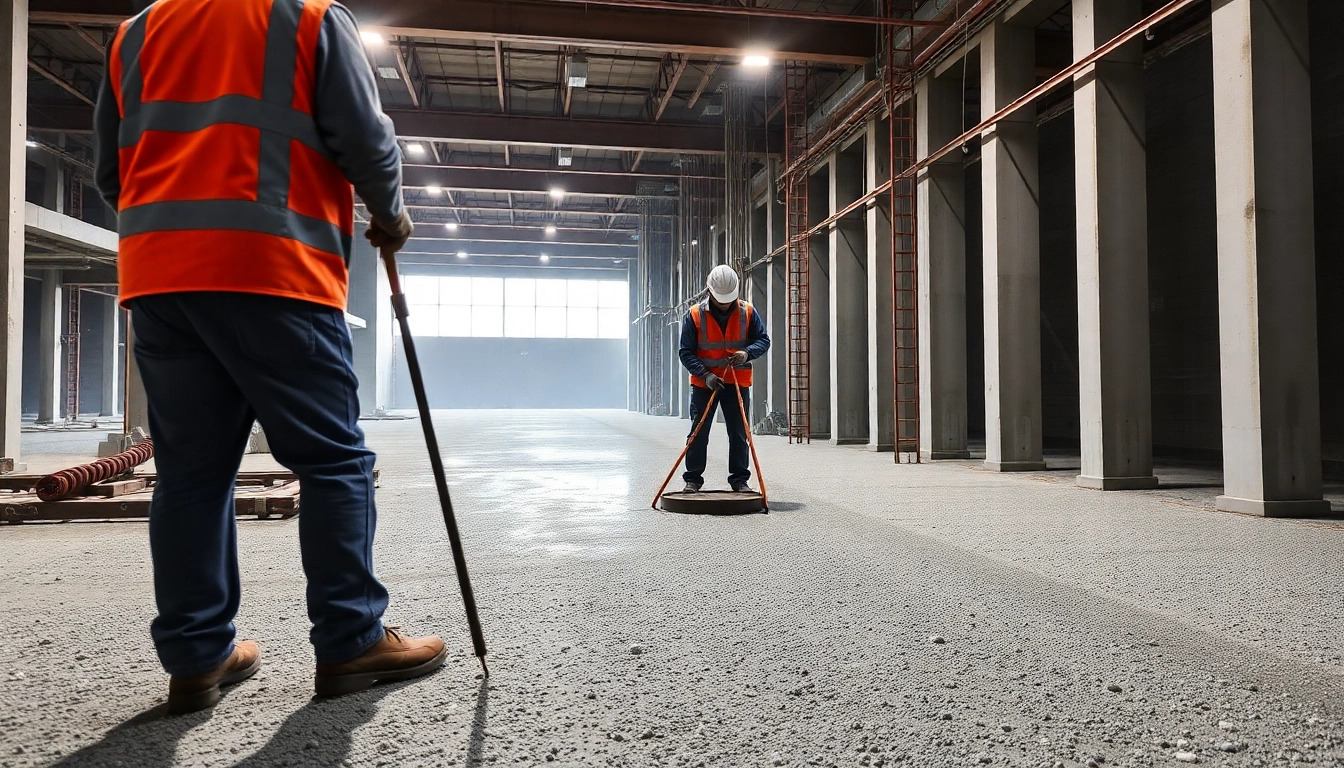Understanding Liquid Screeding in Birmingham
In the rapidly evolving world of construction and flooring solutions, liquid screeding has established itself as a superior method for creating level, durable, and efficient flooring surfaces. Especially in Birmingham, where modern building projects demand speed, precision, and sustainability, liquid screeding offers significant advantages over traditional methods. For those embarking on new builds or refurbishment projects, understanding the nuances of Liquid screeding Birmingham can be a game-changer in project planning and execution.
What Is Liquid Screed and How Does It Work?
Liquid screed is a free-flowing, pumpable material primarily composed of a special blend of cement, sand, and additives that enhance its workability and setting characteristics. Unlike traditional dry sand and cement mixes, liquid screed is poured directly onto prepared subfloors, spreading out evenly to create a smooth, level surface. Its fluid nature allows for rapid application across large areas, significantly reducing construction times.
The process involves preparing the subfloor, positioning the flowable screed through specialized pumps, and then levelling and smoothing the surface. Once poured, it naturally seeks its level, filling all corners and irregularities, which results in a highly uniform base ideal for finishing layers such as flooring, tiles, or carpets.
As a modern alternative to traditional screeding, liquid screed integrates advanced additives to accelerate curing times, improve flowability, and enhance bonding strength, making it ideal for underfloor heating systems and precision floor installations.
The Benefits of Using Liquid Screeding in Construction Projects
- Speed and Efficiency: Liquid screed’s pumpable nature allows for swift application over large areas, often reducing project timelines by days compared to traditional methods.
- High Precision and Flatness: Its ability to flow and self-level ensures a remarkably flat surface, which minimizes the need for additional levelling or grinding during the finishing stages.
- Enhanced Compatibility with Underfloor Heating: Its excellent thermal conductivity and adhesion make liquid screed a preferred choice for underfloor heating systems, offering even heat distribution and improved energy efficiency.
- Sustainability: Modern formulations often incorporate eco-friendly additives, resulting in lower emissions during mixing and curing, aligning with green building standards.
- Reduced Waste and Rework: Precise pouring and leveling minimize material wastage and the need for rework, leading to cost savings and less material impact.
- Versatility: Suitable for various subfloor types, including concrete, timber, and insulation boards, with the ability to incorporate insulation layers and vapour barriers underneath.
In Birmingham’s dynamic construction environment, adopting liquid screeding translates into quicker build cycles and superior flooring quality, crucial for both commercial and residential developments.
Common Applications of Liquid Screed in Birmingham Homes and Businesses
Liquid screed serves a diverse range of applications across Birmingham’s building sector, playing a pivotal role in projects such as:
- Underfloor Heating Systems: Ensuring efficient heat transfer and uniform distribution, liquid screed underpins many modern heating installations in both domestic and commercial properties.
- Commercial Developments: Large-scale office blocks, retail units, and warehouses benefit from the speed of liquid screeding, allowing swift turnover between construction phases.
- Residential Renovations: From new build homes to refurbishments, liquid screed provides a smooth foundation for various flooring finishes, including tiles, wood, and carpet.
- Industrial Flooring: Its durability and flatness are suited for factories and industrial facilities requiring resilient and precise flooring standards.
- Public Infrastructure Projects: Schools, hospitals, and community centers leverage liquid screed’s quick-setting properties to meet tight deadlines without compromising quality.
Company examples like Diamond Liquid Screed and SD Liquid Screed in Birmingham demonstrate the regional demand and expertise in deploying this innovative flooring solution across sectors, highlighting its adaptability and benefits.
Choosing the Right Liquid Screeding Contractor in Birmingham
Key Factors to Consider When Selecting a Service Provider
Partnering with an experienced and reputable contractor is vital to achieving optimal results. Key considerations include:
- Experience and Track Record: Look for contractors with proven expertise in Birmingham projects, demonstrated through portfolio and client testimonials.
- Certifications and Qualifications: Ensure the team holds relevant certifications for installation standards, health & safety, and environmental compliance.
- Range of Services: Choose providers offering comprehensive solutions—consultation, supply, installation, and aftercare—to streamline project management.
- Equipment and Technology: Modern pump systems and quality materials are essential for consistent application and curing outcomes.
- Adherence to Standards and Regulations: Verify compliance with UK building codes and industry standards for safety and quality assurance.
By thoroughly vetting potential contractors such as SD Liquid Screed or Screed It, clients can ensure a seamless installation process aligned with project specifications.
Questions to Ask Your Liquid Screeding Specialist
Effective communication is fundamental. Consider asking about:
- Their experience with similar projects in Birmingham.
- The types of liquid screed formulations they use and their suitability for your application.
- Project timelines and scheduling considerations.
- Preparation requirements and potential challenges specific to your site.
- Guarantees and after-sales support.
Preparing these questions upfront facilitates clarity and fosters a partnership built on professionalism and trust.
Assessing Certifications and Experience in Birmingham Projects
Regional expertise is a crucial indicator of a contractor’s capability to handle Birmingham’s specific building conditions. Suppliers like DMD Floorscreeds or GM Floorscreed leverage decades of local experience, ensuring their solutions are tailored to Birmingham’s climate, regulations, and construction practices. Certifications from recognized bodies like the British Standards Institution (BSI) or Constructionline further reinforce their reliability.
Installation Process and Best Practices for Liquid Screeding
Step-by-Step Guide to a Successful Liquid Screed Application
- Site Survey and Preparation: Clearing, levelling, and ensuring the subfloor is dry, clean, and structurally sound.
- Edge and Leveling Guides Setup: Installing perimeter beads and guides to control flow and height.
- Mixing and Pumping: Combining materials with specified additives and pumping through specialized equipment.
- Pouring and Spreading: Discharging the liquid screed from the pump, ensuring even distribution across the area.
- Levelling and Finishing: Using smoothing tools or paddles to achieve precise flatness.
- Curing and Protection: Applying curing compounds or coverings to prevent premature drying or cracking.
Preparation, Pouring, and Finishing Techniques
Effective preparation involves thorough cleaning and moisture control of the subfloor. During pouring, maintaining a steady flow rate prevents air entrapment and unevenness. Finishing techniques such as trowelling or screeding ensure a smooth surface, ready to receive final flooring layers. Experts recommend working in sections to maintain control and consistency.
Moreover, proper curing—keeping the screed moist or protected from rapid drying—is critical to achieving maximum strength and durability. Timely inspection and feedback during each stage mitigate issues and facilitate seamless project progression.
Tips for Ensuring Longevity and Performance of the Floor
- Use high-quality materials compliant with industry standards.
- Maintain optimal environmental conditions during curing—ideal temperature and humidity.
- Ensure proper adhesion between screed and subsequent floor finishes.
- Implement regular inspection routines post-installation to monitor and address any signs of cracking or irregularity early.
- Partner with experienced contractors familiar with Birmingham’s construction climate for best results.
Cost, Efficiency, and Performance Metrics for Liquid Screed in Birmingham
Pricing Trends and Budget Planning
In Birmingham, the cost of liquid screeding typically ranges from £20 to £40 per square meter, depending on factors such as project size, complexity, and specific formulation requirements. While this may seem higher than traditional screeding, the overall savings achieved through faster application, reduced waste, and fewer reworks often outweigh initial expenses. Early consultation with local providers can help establish accurate budgets aligned with project goals.
Timeframes and Project Completion Expectations
One of the key advantages of liquid screed is its rapid curing times, often allowing for subsequent flooring installation within 24–48 hours for certain formulations. Large projects can see significantly reduced timelines—sometimes completing in half the time of classical methods—facilitating quicker tenant occupation and revenue generation in commercial developments.
Evaluating Quality and Durability Outcomes
Quality assurance involves verifying the use of certified materials, adherence to mixing protocols, and proper curing processes. Durable liquid screed can support decades of use with minimal maintenance, provided installation best practices are followed. Periodic testing, such as flatness measurement and compressive strength assessments, ensures performance standards are met or exceeded.
Maintenance and Future Trends in Liquid Screeding
Routine Care for Long-Lasting Floors
Maintenance primarily involves regular cleaning and promptly addressing any surface damage or cracking. Avoiding excessive moisture or harsh chemicals preserves the integrity of the screed. For floors with underfloor heating, periodic temperature checks prevent thermal stress, extending the lifespan of the surface.
Emerging Technologies and Eco-Friendly Alternatives
Innovations in liquid screeding include the development of bio-based additives, recycled content formulations, and low-carbon cement variants. These sustainable options align with Birmingham’s growing emphasis on environmentally responsible construction, reducing carbon footprints while maintaining performance standards.
Innovations Enhancing Efficiency and Sustainability in Birmingham
Smart pouring and curing management systems, along with real-time quality monitoring tools, enhance installation precision. The adoption of such technologies not only improves efficiency but also ensures compliance with evolving building regulations and eco-certifications. Local contractors embracing these advancements position Birmingham as a leader in sustainable construction practices.



